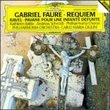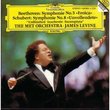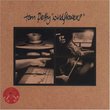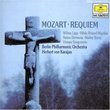| All Artists: Wilhelm Furtwangler, Yehudi Menuhin, Philharmonia Orchestra, Berlin Philharmonic Title: Great Recordings Of The Century - Beethoven; Mendelssohn: Violin Concertos / Furtwangler, Menuhin Members Wishing: 2 Total Copies: 0 Label: EMI Classics Release Date: 5/4/1999 Album Type: Original recording remastered Genre: Classical Styles: Chamber Music, Forms & Genres, Concertos, Historical Periods, Classical (c.1770-1830), Modern, 20th, & 21st Century, Instruments, Strings Number of Discs: 1 SwapaCD Credits: 1 UPC: 724356699021 |
Search - Wilhelm Furtwangler, Yehudi Menuhin, Philharmonia Orchestra :: Great Recordings Of The Century - Beethoven; Mendelssohn: Violin Concertos / Furtwangler, Menuhin
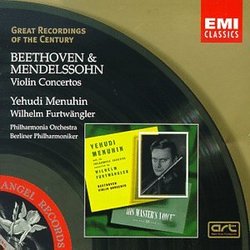 | Wilhelm Furtwangler, Yehudi Menuhin, Philharmonia Orchestra Great Recordings Of The Century - Beethoven; Mendelssohn: Violin Concertos / Furtwangler, Menuhin Genre: Classical
Yehudi Menuhin and Wilhelm Furtwängler, born a generation apart and separated by a world at war, were nonetheless musical and philosophical soulmates. Their recording of the Beethoven Violin Concerto, made seven years... more » |
Larger Image |
CD DetailsSynopsis
Amazon.com essential recording Yehudi Menuhin and Wilhelm Furtwängler, born a generation apart and separated by a world at war, were nonetheless musical and philosophical soulmates. Their recording of the Beethoven Violin Concerto, made seven years after they first met, is one of the treasures of the EMI archive, a testament to a bygone era of spontaneous and deeply subjective music-making. There is a nobility to the reading that has never been equaled, an unforced passion that would be difficult for any of today's musicians to duplicate. The monaural recording is remarkably fine, with satisfying depth and abundant detail. --Ted Libbey Similarly Requested CDs
|
CD ReviewsOne of the best recordings available John Grabowski | USA | 05/14/2001 (5 out of 5 stars) "If you love this work you won't want this recording out of your collection, even though arguably both men have an even finer performance in the catalogue: a live performance from 1947 on Music & Arts. But that performance has inferior sound--the violin almost disappears at times--while this one sounds remarkably fine for 1953. WF is on an unmatched spiritual plane here, leading the Philharmonia (NOT the Berlin Philharmonic as some reviews mistakenly say) in a communion. While Menuhin is possibly a bit more "ruddy" than in the 1948 M&A performance, he's still in fine form overall, even if he drops a note here and there and has the occasional slight intonation problem. This is Beethoven with a life that so few performers give him today, as they're too busy fretting over whether they are rending the text exactly "as Beethoven intended," rather than just living the music. Along with Chung/Tennstedt, Schneiderhan/Jochum, the aforementioned 1948 M&A (which is my top-drawer recommendation, but the sound is poor), Stern/Bernstein (especially for the wonderful handling of the cadenzas), and Zehetmair, Bruggen (HIP) for the stunningly fresh take, this is one of the must-own LvB Violin Concerti on record. Notice I didn't mention Heifetz, because I always feel he's more concerned with his own virtuosity than with Beethoven's music. I know that's not the popular view, but I've never been convinced by his recordings. But the reader need have no fear with the present release, which is superb in every way." Glorious! 09/11/1999 (5 out of 5 stars) "So far, I've heard the Beethoven Violin Concerto recordings of Heifetz/Toscanini, Milstein/Steinberg, Szeryng/Haitink, Heifetz/Munch, Sziegeti/Walter and Jamie Laredo. While I personally think that the Milstein is a remarkable asthetic jewel, the Menuhin/Furtwangler of the Beethoven Violin Concerto, Op. 61, is an incredible achievement. Truly, a monumental performance and collaboration. While Menuhin attacks and stretches his amazing virtuosity, together with Furtwangler and the Philarmonia Orchestra, they glorify Beethoven's concerto. And, their Mendelssohn with the Berliner Philharmoniker is equally beautiful." Choosing between two versions from Menuhin and Furtwangler Santa Fe Listener | Santa Fe, NM USA | 01/01/2006 (4 out of 5 stars) "In the Beethoven, reviewers here consistently prefer the live 1947 radio broadcast from the Lucerne Festival over this 1953 studio recording from London. I'm not sure the choice is that clear, however, until one knows the salient details.
Lucerne 1947: Historically, this is a touching momento of Menuhin's decision to appear with Furtwangler soon after the war, at a time when the conductor's de-Nazification was slow and painful. Menuhin's gesture helped to rehabilitate Furtwangler in circles that had condemned him, and this Beethoven concerto performance shows how musically sympathetic the two artists were. Menuhin is placed far forward in Lucerne, his tone bright and at times shrill but nonetheless warm enough to listen to without wincing. His technique is adequate to the piece but no more. Furtwangler gives almost an identical accompaniment in both recordings, although the Lucerne Festival Orchestra is notably less polished than the Philharmonia in the studio. Sonics are good radio mono. Tempos are the same in both recordings except for the slow movement, which is 2 min. slower in Lucerne. Menuhin opens the finale firmly and in tune. 1953 London: This studio recording is in quite good mono for its day, and the Philharmonia sounds especially warm and inviting. One notes a metallic edge in both orchestra and soloist at loud volumes (I haven't heard the latest remastering, which might have solved this problem). Menuhin's technique is no longer adequate to the part, though his interpretation hasn't changed in six years. He is quite out of tune beginning the finale, with gravelly tone on the G string. In both performances his approach is cautious rather than free and rhapsodic. Furtwangler's accompaniment has great depth and lyric flow, without the drama he is capable of in Beethoven, however. It's often said that he felt constrained in the studio and freer in concert, but in this case both accounts are quite similar. After all is said and done, the difference isn't so much interpretive but technical--Menuhin had slipped too far by 1953, at least to this listener. The final and most important question is whether these are deeply felt and noble performances. Surprisingly, I didn't find them so this time around, but I did ten years ago. Subjectivity plays a crucial part in the role of the listener. I can sympathize with people who feel ennobled by these readings even though they have dimmed for me. The Mendelssohn concerto from 1953 isn't an afterthought. This was always one of Menuhin's best pieces, and here he preforms it with moderate tempos and the kind of personal expression perfectly matched to Furtwangler's own. There are more mercurial readings but few as emotionally sympathetic." |

 Track Listings (6) - Disc #1
Track Listings (6) - Disc #1


